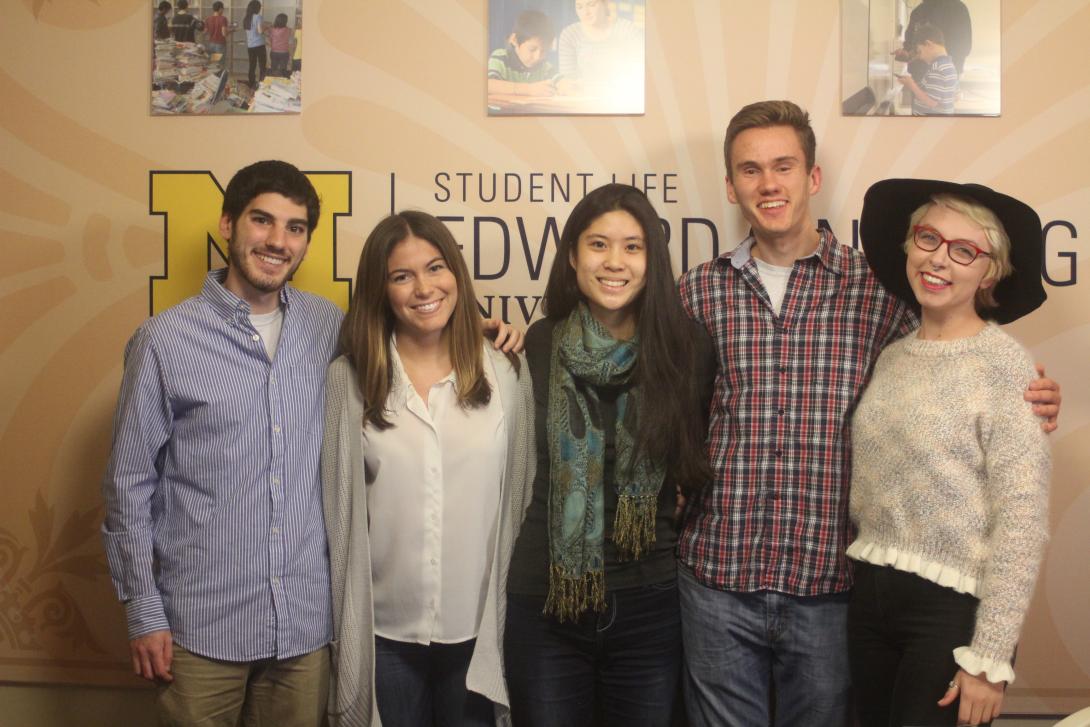The 2025-2026 CLF application is now open. Click here to apply.
Student Applicants
Who: Rising junior and senior students at UM-Ann Arbor, and/or participants in UM-LSA's Transfer Bridges Program, who are interested in addressing community-identified needs and furthering their leadership learning.
Time Commitment: Each fellow commits to 8-10 hours a week for both the Fall and Winter semesters, consisting of the following:
-
~8 hours of work each week with a local nonprofit organization, school, or government agency
-
~2 hours spent in monthly cohort meetings
-
~1 hours spent in monthly check-ins (for individual coaching and mentorship)
Application: The application for this year's cohort is now open. The deadline to apply is Friday, March 28th, 2025.
Information Sessions: You can learn more about the CLF program at an upcoming information session. Register here.
Please contact the Fellows advisor, Dr. Jesse Carr at [email protected] with any questions.
Community organizations: Are you interested in hosting a Community Leadership Fellow for the 2024-2025 academic year? Email [email protected] to set up a consultation.
The Ginsberg Center for Community Service and Learning offers a year-long fellowship for undergraduate juniors and seniors at the University of Michigan-Ann Arbor.
The Community Leadership Fellows program seeks to provide students an opportunity to apply their existing leadership experience, community-based work, and classroom learning to a real-world internship experience that directly addresses community needs and priorities.
Projects will be determined by the interests and previous experiences of each fellow, and the availability of local partner organizations who serve as internship sites . Fellows participate in ongoing leadership development training and mentorship, connect as a cohort, and engage in critically reflective practice throughout the program. Each Ginsberg Fellow will be awarded a $5,000 stipend distributed over the course of the academic year (~September - April).
Frequently Asked Questions
What does the typical week look like for a Community Leadership Fellow?
Each fellow is expected to commit 10 hours a week for the program. The bulk of that time (~8 hours per week) is spent working with your intern placement site. The balance of time is spent in fellowship cohort meetings and individual check-ins with their fellowship advisor. At the beginning of the term, each fellow will work with their fellowship site and the fellows advisor to determine a schedule that meets the organization's needs while also accommodating the students' coursework and other responsibilities.
At what sites will Fellows be placed?
The Ginsberg Center is proud to work with campus and community organizations that align with our mission to create social change for the common good. Each year, we work with community organizations to identify who would benefit from a fellowship placement. Past fellows' sites have included:
- The Washtenaw Housing Alliance
- Interfaith Council for Peace and Justice
- Postive Impact for Life
- Survivors Speak
- Food Gatherers
- Hope Village
- 826 Michigan
- Washtenaw County Public Health Department
- Avalon Housing
- SafeHouse
- Habitat for Humanity
- The Office of Community and Economic Development
- The ChildCare Network
- We the People Michigan
- Willow Run Acres
- Resource Generation
- The My Future Fund
Fellows will be placed with an organization based on the needs and availability of community partner organizations, and guided by fellows' expressed interests, skills, experience, and personal development goals.
What are past projects that have been completed?
In the past, fellows have completed a wide variety of projects. Examples include:
- Coordinate program assessment initiatives to inform organizational effectiveness and impact
- Create and facilitate trainings for community members and clients
- Organize advocacy campaigns around local and state policymaking
- Coordinate communication strategies for policy advocacy, including press releases, newsletters, and community meetings
- Oversee grassroots fundraising campaigns and events
- Design curriculum for and facilitate programs
- Tutor, mentor, and teach local K-12 students
- Conduct research, and publish findings, on elected bodies across Washtenaw County
- Write grants for community-based organizations and initiatives
What is it like to be in the cohort?
In line with the principles of the Ginsberg Center, learning is best done in community with others. The fellows program uses a cohort model in which the learning and growth that fellows receive is mutual and connected. Fellows are responsible for their own development and are expected to contribute to the learning, growth, and support of their cohort-mates. In the bi-weekly meetings, different aspects of community engagement and leadership will be explored through activities, presentations, and critical reflection.
What is on the application?
You must complete the application in qualtrics, but you can preview the questions here. (Link opens as a view-only PDF.)
Is there a minimum GPA requirement?
Fellows must remain in good academic standing to remain eligible for participation, but there is no minimum GPA required to apply. Students may choose to include their GPA on their resume, but GPA is not a primary consideration in fellowship selection.
How are fellows selected?
The most weight is given to the following application components:
- The 1-pg resume, specifically the applicant's prior work and volunteer experience (including experience with student or community organizations)
- The responses to the short-essay questions regarding how the applicant can contribute to a local nonprofit organization, and how participating in the CLF program connects to the applicant's future goals or aspirations
- The applicant's capacity to make the time commitment required for success in the fellowship
For more information please contact Dr. Jesse Carr, [email protected]

